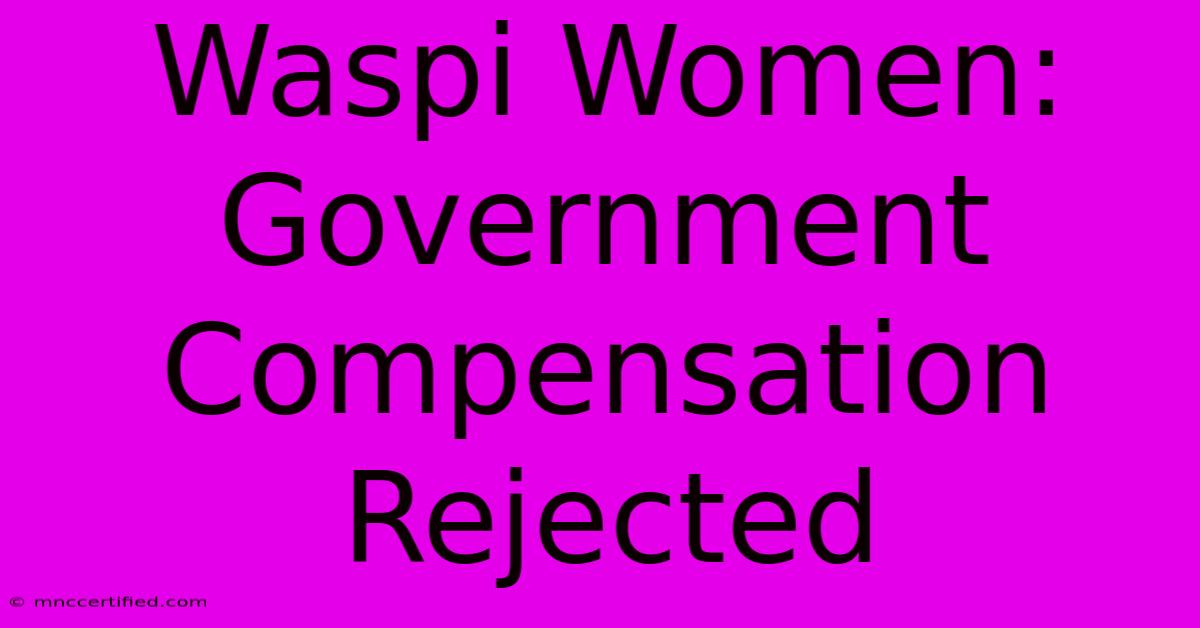Waspi Women: Government Compensation Rejected

Table of Contents
Waspi Women: Government Compensation Rejected – A Deep Dive into the Ongoing Struggle
The rejection of government compensation for Waspi women continues to be a source of anger and frustration for thousands of women across the UK. This article delves into the complexities of the issue, exploring the reasons behind the rejection, the ongoing campaign for justice, and the potential future of the fight for compensation.
Understanding the Waspi Women Issue
The acronym WASPI stands for Women Against State Pension Inequality. These women were born in the 1950s and were affected by changes to the state pension age, which were implemented earlier than previously communicated. Many experienced significant financial hardship due to the unexpected changes, finding themselves forced into early retirement with inadequate savings or pension provision. The government's decision to accelerate the increase in the state pension age left many feeling betrayed and let down, arguing that they had insufficient notice to adjust their financial plans.
Key Arguments of the Waspi Women
The core argument of the Waspi women centers around inadequate notification. While the changes were legally implemented, many argue that the government failed to provide sufficient and timely communication about the alterations to the pension age. This lack of clarity, they claim, led to significant financial hardship and distress. Further complaints highlight the lack of support offered to mitigate the impact of these changes, leaving many women struggling financially during their retirement years.
The Government's Rejection of Compensation
The government has consistently rejected calls for compensation, citing the legality of the changes and the significant cost associated with providing financial redress. They maintain that the changes were necessary to ensure the long-term sustainability of the state pension system. This argument, however, has failed to resonate with many Waspi women, who feel the government's actions were unfair and lacked compassion. The government's position emphasizes the financial implications of paying compensation to a large number of women, arguing it would place an unsustainable burden on the public purse.
The Legal Battles and Setbacks
Waspi women have pursued various legal avenues to challenge the government's decision. While some legal battles have yielded limited success in highlighting procedural failings, the overall outcome has been largely disappointing. This lack of significant legal victories has fueled the ongoing campaign and strengthened the resolve of many Waspi women to continue their fight.
The Ongoing Campaign and Future Prospects
Despite the setbacks, the Waspi women's campaign continues. Their relentless efforts to raise awareness and maintain pressure on the government demonstrate their unwavering commitment to achieving justice. The campaign relies on:
- Public awareness: Maintaining consistent media presence and public demonstrations.
- Political pressure: Lobbying MPs and engaging in political dialogue.
- Community support: Building solidarity and sharing experiences amongst affected women.
The future of the campaign remains uncertain. However, the unwavering determination of Waspi women suggests the fight for compensation will likely continue. Potential avenues for future action might include further legal challenges, intensified political lobbying, and continued public pressure.
SEO Keywords Used:
- Waspi women
- State pension inequality
- Government compensation
- Pension age increase
- Women against state pension inequality
- State pension
- Retirement planning
- Financial hardship
- Legal battle
- Campaign for justice
This article aims to provide comprehensive coverage of the Waspi women's issue, incorporating relevant keywords naturally throughout the text to improve search engine optimization. Remember to promote this article through social media and other online channels to further boost its visibility.

Thank you for visiting our website wich cover about Waspi Women: Government Compensation Rejected. We hope the information provided has been useful to you. Feel free to contact us if you have any questions or need further assistance. See you next time and dont miss to bookmark.
Featured Posts
-
Florida Basketball Stays Unbeaten Tops Unc
Dec 18, 2024
-
Cavendish Family Life Wife And Kids
Dec 18, 2024
-
Who Is Fallon Sherrock Dating Net Worth Revealed
Dec 18, 2024
-
First Look Schwarzenegger As Santa
Dec 18, 2024
-
Are Honda And Nissan Merging
Dec 18, 2024